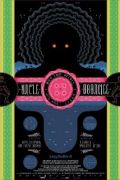
Directed by
Apichatpong Weerasethakul
114 minutes
Rated PG
Reviewed by
Bernard Hemingway

Uncle Boonmee Who Can Recall His Past Lives
Synopsis: In a Thai village Uncle Boonmee is dying and he reflects on his life and what lays beyond.Uncle Boonmee Who Can Recall His Past Lives won the Palme d'Or at the 2010 Cannes Film Festival, an achievement which should help it find an audience. However unless said audience is prepared for a film which barely adheres to the conventions of Hollywood narrative cinema - plot and character development in particular - they may well find this difficult to sit through. It is also a difficult film to comment upon critically as there are a raft of cultural and personal references to Apichatpong Weerasethakul’s film that are clearly important for its appreciation, references which will mean little or nothing to non-Thai audiences.
The film is the final instalment in a multi-media project called Primitive that deals with the region of Isan in Thailand's northeast, and in particular the village Nabua in Nakhon Phanom, just by the border to Laos. Previous instalments include a seven-part video installation and the two short films A Letter to Uncle Boonmee and Phantoms of Nabua.. The project deals with themes of memory, change and loss and makes reference to a violent 1965 crack down on communist sympathisers in Nabua by the Thai army. The main focus of present film deals with the last days of Uncle Boonmee and consists of six reels each shot in a different cinematic style, in the words of the director, "old cinema with stiff acting and classical staging", "documentary style", "costume drama" and "my kind of film when you see long takes of animals and people driving". Apichatpong further explained in an interview with Bangkok Post: "When you make a film about recollection and death, you realise that cinema is also facing death. Uncle Boonmee is one of the last pictures shot on film - now everybody shoots digital. It's my own little lamentation".[Quotations courtesy of Wikipedia].
Given these circumstances, for me Uncle Boonmee worked as a dream-like world of images, as when Boonmee’s dead son and wife reappear to him, or in particular in a segment in which a woman has sex with a catfish while floating on her back next to a waterfall. Whilst I found this film a far more effective account of the connection between the living and the dead than Eastwood's currently screening Hereafter, I would not dare, however, to say that I took away more than a soupçon of the world view to which it refers. If the drabbest kind of cinema is one in which all the gaps have been filled in, going in the opposite direction, Uncle Boonmee can justly be said to have the reverse effect.

Want more about this film?


Want something different?




